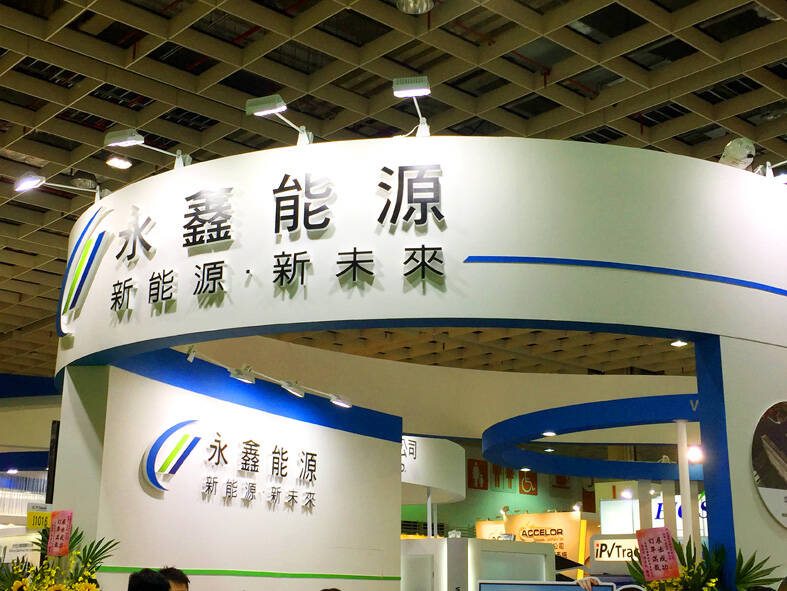Google on Monday said it is planning to invest in New Green Power Co (NGP, 永鑫能源), a solar energy developer owned by BlackRock Inc, to build 1 gigawatt of solar capacity in Taiwan to supply clean energy for its local data center and offices.
“Our investment in NGP, subject to regulatory approval, will serve as development capital toward its 1 GW pipeline of new solar projects, catalyzing critical equity and debt financing for those projects,” Google’s Data Center Energy global head Amanda Peterson Corio wrote on a company blog.
It did not disclose financial details.

Photo: Chang Hui-wen, Taipei Times
“We expect to procure up to 300 megawatts of solar energy from this pipeline through power purchase agreements and the associated energy attribute certificates (Taiwan Renewable Energy Certificates or T-RECs) to help meet electricity demand from our data center campus, cloud region and office operations in Taiwan,” Corio wrote.
Google has been operating a US$600 million data center in Changhua County since 2013.
The company might take a step further by offering a portion of this clean energy capacity to its semiconductor and manufacturing partners in the region so they can advance their sustainability goals while helping Google reduce its Scope 3 emissions, the indirect emissions from its value chain, Corio wrote.
“As we witness growth in demand for digital services, powered by artificial intelligence and data center technologies, it becomes imperative to invest in clean energy,” BlackRock global head of climate infrastructure David Giordano said on the Google blog.
Google’s new solar investment has helped boost the share prices of the nation’s major solar module manufacturers amid expectations that the large-scale clean energy project would stimulate solar module demand locally given Taiwan’s complete solar energy supply chain.
Google’s plan to build 1 gigawatt of solar energy is equal to 40 percent of the nation’s solar energy installation totaling 2.5 gigawatts last year.
The stock prices of Motech Industries Inc (茂迪), TSEC Corp (元晶) and United Renewable Energy Co (聯合再生) yesterday rallied 9.95 percent, 10 percent and 9.81 percent to close at NT$34.25, NT$31.35 and NT$14.55 respectively.
Google’s latest solar energy project could help alleviate the tight supply of green energy in Taiwan.
To address that issue, the Taiwan Photovoltaic Industry Association (台灣太陽光電產業協會) said it has proposed to the nation’s major power users, mostly technology companies, to build their clean energy capacity and most of them agreed.

South Korea’s equity benchmark yesterday crossed a new milestone just a month after surpassing the once-unthinkable 5,000 mark as surging global memory demand powers the country’s biggest chipmakers. The KOSPI advanced as much as 2.6 percent to a record 6,123, with Samsung Electronics Co and SK Hynix Inc each gaining more than 2 percent. With the benchmark now up 45 percent this year, South Korea’s stock market capitalization has also moved past France’s, following last month’s overtaking of Germany’s. Long overlooked by foreign funds, despite being undervalued, South Korean stocks have now emerged as clear winners in the global market. The so-called “artificial intelligence

NEW IDENTITY: Known for its software, India has expanded into hardware, with its semiconductor industry growing from US$38bn in 2023 to US$45bn to US$50bn India on Saturday inaugurated its first semiconductor assembly and test facility, a milestone in the government’s push to reduce dependence on foreign chipmakers and stake a claim in a sector dominated by China. Indian Prime Minister Narendra Modi opened US firm Micron Technology Inc’s semiconductor assembly, test and packaging unit in his home state of Gujarat, hailing the “dawn of a new era” for India’s technology ambitions. “When young Indians look back in the future, they will see this decade as the turning point in our tech future,” Modi told the event, which was broadcast on his YouTube channel. The plant would convert

‘SEISMIC SHIFT’: The researcher forecast there would be about 1.1 billion mobile shipments this year, down from 1.26 billion the prior year and erasing years of gains The global smartphone market is expected to contract 12.9 percent this year due to the unprecedented memorychip shortage, marking “a crisis like no other,” researcher International Data Corp (IDC) said. The new forecast, a dramatic revision down from earlier estimates, gives the latest accounting of the ongoing memory crunch that is affecting every corner of the electronics industry. The demand for advanced memory to power artificial intelligence (AI) tasks has drained global supply until well into next year and jeopardizes the business model of many smartphone makers. IDC forecast about 1.1 billion mobile shipments this year, down from 1.26 billion the prior

People stand in a Pokemon store in Tokyo on Thursday. One of the world highest-grossing franchises is celebrated its 30th anniversary yesterday.